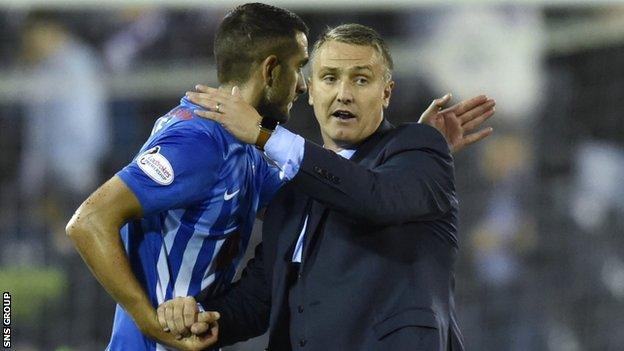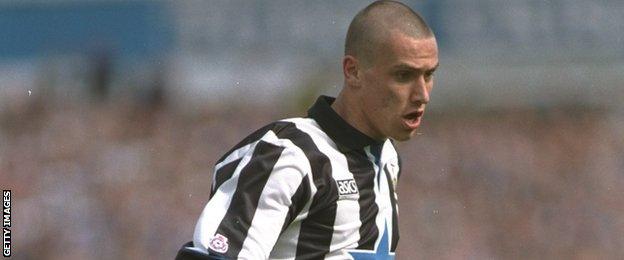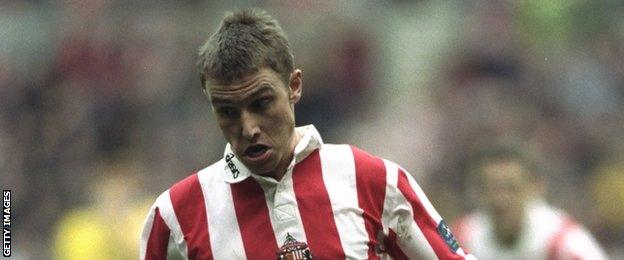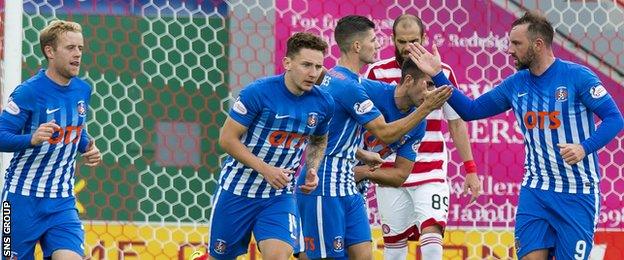Kilmarnock's Lee Clark: 'I would have hated managing me'
- Published

Clark has completely overhauled the squad since his arrival at Rugby Park in February
When Michael Jackson popped his head around the door at Craven Cottage that day, Lee Clark knew he had entered some kind of parallel universe.
It was impressive enough being introduced to Sophia Loren at Harrods on the day he joined Fulham as a player in 1999, not to mention the time his new chairman, Mohamed Al-Fayad, told him to come and say hello to Tony Curtis and listen to his stories about starring alongside Marilyn Monroe.
Jackson was trippier still. "Aye, I met Michael," says the Kilmarnock manager. "Or, at least, I saw him. We were sitting in the changing room and the door opens and this head comes through the gap. Michael Jackson."
The only head that has come through the door at Rugby Park this afternoon belongs not to a global superstar but a representative from a local venetian blinds company wanting to measure some windows.
It's not Hollywood, baby, but it's enough. For Clark, the job of trying to drag the team out of their annual grind against the drop is the only thing that matters.
What strikes you about Clark is his intensity, his raging desire to make things work at Killie where he has a virtually brand new team on his hands and an Everest to climb to try to tie it all together. "Absolute faith" is a favourite expression.
'I was a handful at times'
He says he eats and sleeps football, has done since he was a boy growing up in the east end of Newcastle.
"I come from a tough part of the city, a place called Walker," he explains. "Two sisters and a brother. My father worked on the building sites, my mother had various jobs to keep things ticking over and they made me the person I am. I'm not a quitter. I like to think that I'm tough.
"As a player, I was honest, I gave my best. I had to think quicker than others because I didn't have huge pace. I could pass and create but above of all I had a never-say-die attitude.
"I know I was a handful at times. I'm not sure that Lee Clark the manager could have handled Lee Clark the player. He was just an absolute hot-head on occasion. There were many, many times when I blew up. I could be the nicest lad off the pitch, but on the pitch I could go crazy. I would have hated managing me."
You put it to the test and ask if he'd like to have his younger self at the heart of his Kilmarnock midfield.
"On reflection, aye," he smiles. "He'd be useful. He'd be well up for it."
Faith in youth
Clark's career has been a fascinating one. He made his Newcastle debut at 17. Ossie Ardiles became his manager. Ardiles believed in young players and pitched them into his side in great numbers. Newcastle didn't get consistency, but they unearthed some talent.

Clark enjoyed an early breakthrough as a player at St James' Park
"We played against Tranmere in what was called the Zenith Data Cup and it finished 6-6. That kinda summed up Ossie. We were naive but we were entertaining and some foundations were put in place for what Kevin [Keegan] did afterwards.
"Here at Kilmarnock I've done a similar thing to Ossie. I did it at Huddersfield as well. Young players. Freshness and dynamism. I have to show the same faith in them that Ossie showed in me and seven or eight of my team-mates.
"Some of our new players from down south are not used to this type of football. They're used to more technical stuff, not the in-your-face aggression of up here. Plus, a few of them have never been away from home before. They're experiencing what that's like as well. They're learning that to win a game of football, it's not just about ability, it's about a battle.
"You have to man-up, you have to fight your way through it. It's the players who are strong mentally who'll survive."
That was never a problem for Clark. He laughs now when he talks about his youngest son, Bobby, who is 11 and is in the Newcastle academy. Bobby was never quite sure whether to believe his father when he told him that he used to play for the club. Then the young man was shown around the place and found his dad's picture on the walls and went, 'Ah, so it's true!'
Twice a runner-up at Newcastle
Clark almost achieved immortality at Newcastle under Keegan in that famous season of 1995-96. At his next club, the Geordies' arch-rivals, Sunderland, he achieved notoriety.
He had two fine years there - getting promoted to the Premier League in one of them - but exited under a cloud. Newcastle played Manchester United in the 1999 FA Cup final and Clark had arranged to meet some mates in a pub on Baker Street in London beforehand.

Clark regrets how his time at Sunderland ended
When he got out of a taxi, he was spotted by Newcastle fans who pulled a t-shirt over his head and started taking pictures.
"There was a derogatory slogan about Sunderland fans on it," recalls Clark. "I had it on for about 30 seconds but the cameras were flashing for fun. When the pictures got out, that was the end of my time at Sunderland.
"A big regret. Huge. I would love to go back to the Stadium of Light and for them to appreciate me for the two great years we had, but there's a bit of hatred there now from the fans."
He entered the wonderful world of Al-Fayed's Fulham and loved his six years there. He won a First Division title in 2001 and, under Jean Tigana, finished ninth in the Premier League. "A great period in my life," he says.
Promising start at Terriers
Clark's first step into management was at Huddersfield in late 2008. They were entertaining, broke club records for unbeaten runs and goals scored [he signed Jordan Rhodes from Ipswich and made him an £8m player], but fell agonisingly short of promotion to the Championship two seasons running.
"What gives me hope at Killie is what we did at Huddersfield," he says. "We built a young team, went 43 games unbeaten at one stage and came very close to promotion. On the day I lost my job we had three defeats in 55 games. That's life. The queue of lads that came to see me to say goodbye was humbling.
"Jordan was one of those. A wonderful kid. There's a picture I have on my wall at home of me embracing Jordan after a game at Sheffield Wednesday. We drew 4-4 and Jordan got all four."

Kilmarnock are 10th in the Premiership with four points from four games
He said he a choice at that point to buckle or to fight - and he fought. He became Birmingham City manager in June 2012 but it did not work. The club's owner, Carson Yeung, had been arrested for money laundering a year before - he was later sentenced to four years in prison - and the club was in financial limbo and forced to sell its best players. He was sacked in October 2014.
Five days later he joined Blackpool. "My silly ego got the better of me. The club was bottom of the league and I thought I could turn it around. I quickly realised I couldn't.
"It was an unhappy place. Fans were demonstrating about the owners and it got very nasty. The atmosphere was poor and we went out of the league with a whimper. I resigned (May 2015) and then took some time out to take stock. Then I got the opportunity to come to Kilmarnock.
"Will it take time to get the club up the table on a consistent basis? Yes. Do managers always get time? No, but I'm hopeful. I want top half of the league. I don't to be always seen as a fire-fighter. I want to get back to where I was at Huddersfield where we were always looking up and striving rather than looking down and worrying.
"I've always said that it's not how people perceive you when you come through the door, it's how they perceive you when you go out."
Can this driven Geordie turn Kilmarnock around? He answers: "A lot of people would say no and that's understandable. We're underdogs, but underdogs have their day, too, you know."
- Published14 January 2018
- Published7 June 2019
